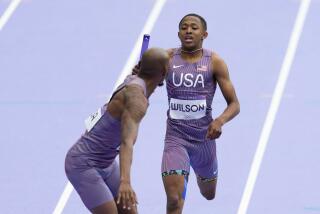Winning Isn’t Only Thing in Men’s 100 Freestyle
- Share via
INDIANAPOLIS — The attention, again, splashed around the actual winner, Neil Walker, and landed on the second-place finisher Gary Hall Jr. . . . and then on the 19-year-old from Valencia who took fifth in the men’s 100-meter freestyle final at the U.S. Olympic swimming trials Sunday.
Hall, who had competed in only one 100 freestyle race in more than two years before coming here, overcame a double dose of adverse personal history--diabetes and a drug suspension.
Then there was Anthony Ervin, who provided a benchmark moment in this sport, when his fifth-place finish positioned him to become the first swimmer of African American heritage to make the U.S. Olympic team.
For the moment, his spot on the squad is provisional. Under the procedures of a complicated formula, he will probably be added to the team in the next couple of days, even as early as today. Ervin, who went to Hart High and will be a sophomore at Cal, will be an alternate on the U.S. 400 freestyle relay. A fifth-place finisher in the 100 has always made the Olympic team, swimming officials said.
“I am of African American background,” Ervin said. “My father [Jack] is African American. . . . I don’t really look at it that much, but I am of African American descent. I look like a white person, but I’ve always been proud of my heritage.”
Ervin said his father is 75% African American and 25% American Indian and his mother, Sherry, is white. He was aware of the historical implications but didn’t dwell on it.
“I don’t really like to think of my swimming in terms of race,” he said. “I’m doing it more for the performance of myself. I’m doing it for my family.”
Ervin’s mother Sherry, at home in California, followed the meet on the Internet.
“I’m ecstatic. It’s a great time for him,” she said, adding that she thought there was too much emphasis on the issue of race. “It’s not the most important thing. It’s not a focus in our family. I know it’s newsworthy, but not to us.”
Ervin’s emergence has been swift. He was a double winner in the sprints at the NCAA championships, setting a short-course world record in the 50 freestyle.
“I’m pretty new to the national scene,” he said. “I wasn’t really a contender until this year. All my buddies in college know about it. All my friends back home know about it.”
Ervin overcame a strong case of nerves, a rarity. His time was a personal-best 49.29 seconds. Walker won in 48.71 and Hall was second in 48.84.
“For some reason it [the nerves] affected me in my prelim swim pretty bad, in the final it was there,” Ervin said. “Usually my attitude toward racing is no fear. Anybody who is ahead of me, I can crush them. I try to think that even though I know it’s a little out of reach. I try to tell myself that even though things weren’t looking so good.
“But I did the best I could, and I’m still going to Sydney, it looks like.”
Another swimmer in the same race, Sabir Muhammad of Atlanta, who finished eighth in 51.00, had been the one fielding the questions of breaking the historic barrier. He said it was never a necessity to be first, rather, he simply wanted to make the team.
A year ago, Hall wasn’t even swimming the 100. The 1996 silver medalist in that event served a brief suspension in 1998 after testing positive for marijuana. Last year, he found out he had diabetes and sometimes needs as many as eight injections a day. Hall said he needed four Saturday because he had two rounds, the prelims and semifinals.
Hall’s father, three-time Olympian Gary Hall Sr., opened Sunday’s session by making an inspirational speech at the Indiana University Natatorium, waving an American flag and chanting, “USA, USA!” His mood must have transferred to his son, who wore red, white and blue boxing trunks on the deck and punched the air.
“I picked them up at a Muhammad Ali fight night at a benefit for Parkinson’s,” Hall said. “I did a little boxing thing with Jason Kidd and I just kept the shorts. I figured I’d use them at some point, I guess for the right occasion. It should be fun.”
Kaitlin Sandeno of Lake Forest, Calif., qualified for her second event in the Olympics, finishing second in the 200 butterfly in 2:09.54, behind Misty Hyman’s 2:09.27. The 17-year-old Sandeno swims for the Nellie Gail Gators.
“I went out a little too hard and didn’t come home as fast as I usually do,” she said.
It was an emotional night for Kristine Quance-Julian of the Trojan Swim Club, who was fifth in 2:14.18, and the 200 butterfly was her last chance to make the 2000 team. “I wish I could have had a happier ending,” said Quance-Julian.
Aaron Peirsol, 17, of the Irvine Novaquatics added some intrigue to his showdown against world-record holder Lenny Krayzelburg of Studio City in today’s 200 backstroke final by posting the fastest time of the heats, 1:57.93, an Olympic trials record..
Krayzelburg, who lost to the teenager in the 200 last month at Los Angeles, went 1:58.10 in the other heat.
“It’s going to be exciting, me and Aaron,” said Krayzelburg, who said it will probably take a time of 1:56 to win.
Said Peirsol: “I think I’ve showed in the past that I can stay with him. We’ll see what happens tomorrow. He wants to defend his title, but I’ll also want to win.”
More to Read
Go beyond the scoreboard
Get the latest on L.A.'s teams in the daily Sports Report newsletter.
You may occasionally receive promotional content from the Los Angeles Times.







